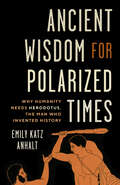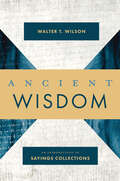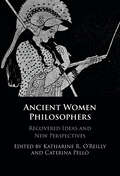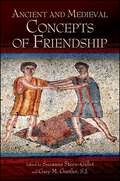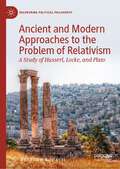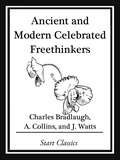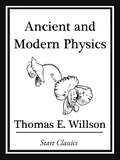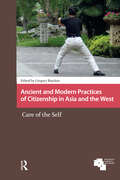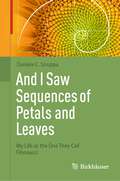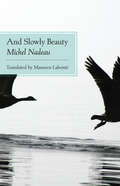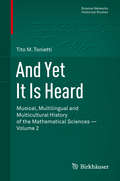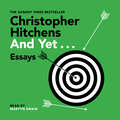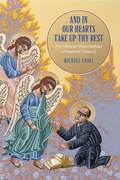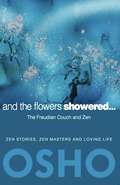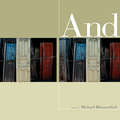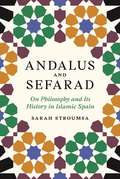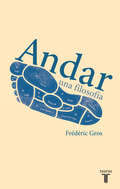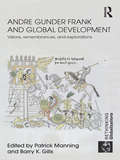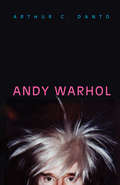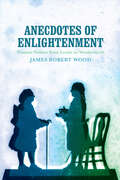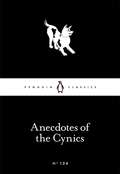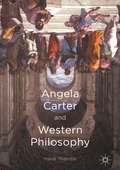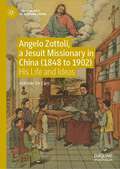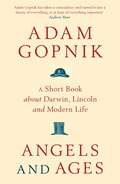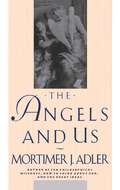- Table View
- List View
Ancient Wisdom for Polarized Times: Why Humanity Needs Herodotus, the Man Who Invented History
by Emily Katz AnhaltHow the wisdom of Herodotus can fortify us against political falsehoods and violent extremism Nearly 2,500 years ago, the Greek writer Herodotus introduced the concept of objective truth derived from factual investigation and empirical deduction. Writing just before the start of the catastrophic Peloponnesian War (431–404 BCE), Herodotus addressed an increasingly polarized Greek world. His Histories demonstrates that the capacity for humane moral action depends on the ability to resist unthinking allegiance to authoritative fictions. Herodotus offers an indispensable, nonpartisan approach for countering poisonous ideologies and violent conflict emanating from all extremes of the political kaleidoscope. Interpreting some of Herodotus’s most compelling stories, Emily Katz Anhalt illuminates this ancient writer’s vital insights concerning sexual violence, deception, foreign ways, political equality, and more. The Histories urges us to value reality, restrain destructive passions, and acknowledge the essential humanity of every human being—crucial guidance for navigating our own divisive and volatile political climate. Inviting us to take responsibility for our own choices and their consequences, Herodotus exposes autocratic leadership and abuses of power as self-defeating. Herodotus guides readers in assembling and assessing information, distinguishing fact from fiction, and making compassionate moral evaluations. The ancient Greeks never achieved an egalitarian, just society. Herodotus equips us to do better.
Ancient Wisdom: An Introduction to Sayings Collections (Wisdom Literature From The Ancient World Ser. #1)
by Walter T. WilsonThis book surveys and analyzes twenty-seven major collections of wisdom sayings from antiquity, including texts from ancient Egypt, the ancient Near East, ancient Israel and early Judaism, early Christianity, and the Greco-Roman world. Through the diversity of these selections, readers are exposed to wisdom literature from a wide array of historical, cultural, and linguistic settings, which unfolds into a larger understanding of how different ancient peoples articulated a gnomic understanding of life. Throughout this useful guide, Walter Wilson keeps a constant eye on the relation of the wisdom texts to the worlds from which they emerged—paying close attention to each text&’s distinctive thematic profile and how its moral agenda was mapped onto the reader&’s social landscape. Where appropriate, he discusses affinities between the different collections and draws conclusions about ancient wisdom literature as a genre. For further study, each entry includes a short bibliography directing the reader to an up-to-date translation of the collection in question and other relevant secondary texts, making this an ideal starting point for anyone studying wisdom literature of the ancient world.
Ancient Women Philosophers: Recovered Ideas and New Perspectives
by Caterina Pellò Katharine R. O’ReillyDespite the common misconception that ancient philosophy was the domain of male thinkers, sources confirm that ancient women engaged in philosophical activity. Bringing together a collection of essays on ancient women thinkers, with special focus on their ideas and contributions to the history of philosophy, this volume is about the earliest women philosophers, their breakthroughs, and the methods we can use to excavate them. The essays survey the methodological strategies we can use to approach the surviving evidence, retrieve the largely unresearched thought and the original ideas of ancient women philosophers, and carve out a space for them in the canon. The broad focus includes women thinkers in ancient Indian, Chinese, and Arabic philosophy as well as in the Greek and Roman philosophical traditions. The volume will be valuable for a wide range of researchers, teachers, and students of ancient philosophy.
Ancient and Medieval Concepts of Friendship (SUNY series in Ancient Greek Philosophy)
by Suzanne Stern-Gillet; Gary M. Gurtler, SJFocusing on Plato and Aristotle, the Stoics and Epicureans, and early Christian and Medieval sources, Ancient and Medieval Concepts of Friendship brings together assessments of different philosophical accounts of friendship. This volume sketches the evolution of the concept from ancient ideals of friendship applying strictly to relationships between men of high social position to Christian concepts that treat friendship as applicable to all but are concerned chiefly with the soul's relation to God—and that ascribe a secondary status to human relationships. The book concludes with two essays examining how this complex heritage was received during the Enlightenment, looking in particular to Immanuel Kant and Friedrich Hölderlin.
Ancient and Modern Approaches to the Problem of Relativism: A Study of Husserl, Locke, and Plato (Recovering Political Philosophy)
by Matthew K. DavisRelativism, or the claim that it is possible that the appearances and opinions of each of us are correct for each of us, and hence that any view is as true as any other, has remained a continuing problem for philosophy and science for 2,500 years. Today, because of the widespread acceptance of relativism, the problem is greater than ever before. This book argues that Plato in fact solved this problem. In the first two chapters, by means of a study of Husserl and Locke, Davis shows that it is possible to return to and take seriously Plato’s treatment of this problem. The third chapter presents Plato’s solution to it. This book is distinctive in that it shows that a problem that has been thought to be present throughout the history of Western thought was in fact solved by Plato, and in that it shows that we can, beginning from our contemporary situation, return to Plato’s solution.
Ancient and Modern Celebrated Freethinkers
by Charles Bradlaugh J. WattsA fascinating exploration of various freethinkers throughout history, including Thomas Hobbes, Shelley, Hume, Voltaire, Paine, Epicurus, Spinoza, Blount, Toland, and many more.
Ancient and Modern Physics
by Thomas E. WillsonExcerpt: ...But there are other problems to be explained, problems of life and mind, and the same knowledge you have explains them as well as the others, if you simply avail yourself of it. That you do not consider the atom as four-fold instead of two-fold is your own fault. I have not told you anything you did not already know. I have only asked you to apply your present knowledge of physics to these problems of life and mind, and apply your reasoning powers. "The chording vibration in an atom of matter of "The two planes produces Force, or phenomena "The three planes produces Life-the silver chord "The four planes produces Mind-the golden chord. "You say there is no gulf between the prakritic and etheric worlds; that it is one continuous world; and all its phenomena are by continuity and not impact. That is true, but it is not the whole truth. "There is no gulf to cross between the prakritic and etheric worlds; none to cross between that and the manasic. The four worlds are one great world, continuous, interchangeable. Through the four as well as through the two, there is continuity and not impact. Whether it is an atom or a world, the four are there. Nothing, no combination of atoms, no matter of any kind, however small or large, can exist in this prakritic world unless it has the four elements, which from time immemorial our philosophers have called Earth, Water, Fire, Air, meaning the four globes or forms of matter in the universe. We do not have to leave the earth to live in the etheric globe. It is here. Nor do we have to go millions of miles to reach the pranic globe. It is here. The problems of light and heat are no easier than the problems of birth and death. The pranic globe is within us; within everything. So is the manasic. "It is here on these higher planes that the chances for worthy study are greatest. At least we think so, though you may not. We live on the manasic-pranic-etheric globe on precisely the same terms that we live on this of...
Ancient and Modern Practices of Citizenship in Asia and the West: Care of the Self (Asian Cities)
by Gregory BrackenWhat does it mean to be a good citizen today? What are practices of citizenship? And what can we learn from the past about these practices to better engage in city life in the twenty-first century? Ancient and Modern Practices of Citizenship in Asia and the West: Care of the Self is a collection of papers that examine these questions. The contributors come from a variety of different disciplines, including architecture, urbanism, philosophy, and history, and their essays make comparative examinations of the practices of citizenship from the ancient world to the present day in both the East and the West. The papers' comparative approaches, between East and West, and ancient and modern, leads to a greater understanding of the challenges facing citizens in the urbanized twenty-first century, and by looking at past examples, suggests ways of addressing them. While the book's point of departure is philosophical, its key aim is to examine how philosophy can be applied to everyday life for the betterment of citizens in cities not just in Asia and the West but everywhere.
And I Saw Sequences of Petals and Leaves: My Life as the One They Call Fibonacci
by Daniele C. StruppaIn this captivating historical novel, Daniele Struppa skillfully weaves a fictional autobiography, bringing Fibonacci to life with vivid details of his upbringing and adult years in Medieval Europe. As we explore the historical context of Fibonacci's time, we delve into the intriguing aspects of a bygone era, painting a compelling picture of a man whose contributions to mathematics continue to resonate today. From his groundbreaking work on congruent numbers to the famous numerical sequence that bears his name, the author invites readers to imagine the creative sparks that ignited Fibonacci's mathematical innovations. When historical evidence is elusive, accuracy and passion are seamlessly combined, offering plausible scenarios grounded in documented facts. A meticulously crafted apparatus of notes distinguishes fact from fiction, providing readers with a clear guide to navigate this enthralling reconstruction of Fibonacci's life. Step into the medieval world ofLeonardo Fibonacci, one of the most celebrated mathematicians in history, and discover the man behind the mathematical genius. Mathematicians and curious readers alike will appreciate the allure of Fibonacci's mathematical brilliance.
And Slowly Beauty
by Michel Nadeau Maureen LabontéEverything changes on what begins as a typical day in the life of the aptly named Mr. Mann, a forty-eight-year-old, buttoned-down, middle management type in a pinstriped grey suit, who feels himself losing touch with his job, his wife, his children, and the rest of his urban life. He wins tickets to a production of Chekhov's Three Sisters and realizes that the mid-life cocoon he has spun around himself is beginning to unwind.And Slowly Beauty, first performed in French in 2003, was created collaboratively by Michel Nadeau and colleagues from his Quebec troupe, Théâtre Niveau Parking. With the intensity of an electric current striking a reflecting pool, Nadeau shows us how Chekhov's century-old drama about the yearning of three sisters in a dreary provincial town directly addresses Mann's own stifled existence and liberates him from his self-imposed "gulag."Mann returns to see Three Sisters a second time, finding that its themes of beauty and poetry lost to the monotony of everyday existence mirror many aspects of his own existence. At the same time, Mann's dying friend realizes that he is for the first time able to appreciate the astonishing beauty of trees outside his window. The irony of such a deathbed admission is not lost on Mr. Mann.With Chekhov's characters and themes coming to inhabit the protagonist's mind and life, emphasized by the repeated image of geese flying overhead - these birds do not question the purpose of their journey but find it sufficient to fly in unison - And Slowly Beauty speaks eloquently to the power of art to transform lives.Cast of 3 women and 3 men.
And Yet It Is Heard: Musical, Multilingual and Multicultural History of the Mathematical Sciences - Volume 2 (Science Networks. Historical Studies #47)
by Tito M. ToniettiWe bring into full light some excerpts on musical subjects which were until now scattered throughout the most famous scientific texts. The main scientific and musical cultures outside of Europe are also taken into consideration. The first and most important property to underline in the scientific texts examined here is the language they are written in. This means that our multicultural history of the sciences necessarily also becomes a review of the various dominant languages used in the different historical contexts. In this volume, the history of the development of the sciences is told as it happened in real contexts, not in an alienated ideal world.
And Yet: A Sunday Times Bestseller
by Christopher HitchensAnd Yet... gathers the previously uncollected essays of the late Christopher Hitchens into a final volume of peerless prose from one of the great thinkers of our times.Christopher Hitchens was an unparalleled, prolific writer, who raised the polemical essay to a new art form, over a lifetime of thinking and debating the defining issues of our times. As an essayist he contributed to the New Statesman, Atlantic Monthly, London Review of Books, TLS and Vanity Fair. Any publication of a volume of Hitchens' essays was a major event on both sides of the Atlantic. Now comes the last of the last; a volume of Hitchens' previously uncollected essays, covering the themes that define Hitchens the thinker: literature, religion and politics. These essays remind us, once more, of the fierce, brilliant and trenchant voice of Christopher Hitchens.
And in Our Hearts Take Up Thy Rest: The Trinitarian Pneumatology of Frederick Crowe, SJ (Lonergan Studies)
by Michael EadesIn his seminary classes and his writings, Frederick Crowe, SJ (1915–2012) sought to understand anew the eternal identity of the Holy Spirit and the Spirit’s role in the Church’s life. Despite Crowe’s fame as a professor of Trinitarian theology and his groundbreaking work on Thomas Aquinas’ doctrine of complacent love as an analogy for the Holy Spirit’s eternal procession, no book has ever been published on this influential Canadian Jesuit, who set up centres around the world for the study of the thought of Bernard Lonergan, SJ (1904–84). Drawing on Crowe’s published works and archival material, Eades emphasizes how Crowe’s Trinitarian pneumatology modestly and creatively extended Lonergan’s theology of the Holy Spirit. Making use of Crowe’s own historical methodology, Eades looks for the emergence of new and significant questions about the Holy Spirit in Crowe’s works.
And the Flowers Showered
by Osho Osho International FoundationUsing eleven Zen stories as a starting point and diving deep into their mysterious world, he then weaves his magical clarity on many diverse contemporary topics. From the true meaning of happiness to an understanding of the process of death, it's all here. To begin reading this book is to commence a journey into the world of wonder.Buddha's disciple Subhuti is showered with blossoms upon experiencing sublime emptiness. But isn't emptiness usually an absence of something? Through his commentary on this seemingly strange tale, Osho illuminates the vast difference between a negative and a sublime emptiness.
And: Life And Loathing In Greater Israel (American Poets Continuum)
by Michael BlumenthalThrough Michael Blumenthal&’s eyes we gain a renewed, childlike wonder at everything from plants, trees, and relationships to the most fundamental word in our vocabulary: AND. Blumenthal uses the conjunction to unify this collection and create a chanting, sonorous rhythm to his work. The result is a book of poems-as-hymns-and-praises.Michael Blumenthal holds the Mina Hohenberg Darden Endowed Chair in Creative Writing at Old Dominion University. His other books include the memoir All My Mothers and Fathers (HarperCollins Publishers, 2002), and the poetry collection Dusty Angel (BOA Editions, Ltd., 1999), for which he was awarded the Isabella Gardner Poetry Award. Blumenthal&’s new collection of poems, titled &“And,&” is the closest that the stoicism of Ecclesiastes will come to getting a 21st-century makeover. In it, there&’s a time to laugh and cry, scatter stones and gather them up, and all the rest. There&’s no point, though, in toil and hope beyond that. After reading these poems, which are designed with a cosmic sweep, you get the feeling that Blumenthal&’s plan is, as in Dylan Thomas&’s poem, eventually just to go gentle into that good night: &“Rage, rage against the dying of the light&” be damned.--THE JEWISH DAILY FORWARDMichael Blumenthal&’s stunning new book, And, is an Eliotic celebration of life in the world as continuum and progress. He achieves this through a simple and seductive meditation upon the conjunction, &“and,&” and the way it enriches the complexity of language as it shapes lived experience.--The Montserrat Review
Andalus and Sefarad: On Philosophy and Its History in Islamic Spain (Jews, Christians, and Muslims from the Ancient to the Modern World #62)
by Sarah StroumsaAn integrative approach to Jewish and Muslim philosophy in al-AndalusAl-Andalus, the Iberian territory ruled by Islam from the eighth to the fifteenth centuries, was home to a flourishing philosophical culture among Muslims and the Jews who lived in their midst. Andalusians spoke proudly of the region's excellence, and indeed it engendered celebrated thinkers such as Maimonides and Averroes. Sarah Stroumsa offers an integrative new approach to Jewish and Muslim philosophy in al-Andalus, where the cultural commonality of the Islamicate world allowed scholars from diverse religious backgrounds to engage in the same philosophical pursuits.Stroumsa traces the development of philosophy in Muslim Iberia from its introduction to the region to the diverse forms it took over time, from Aristotelianism and Neoplatonism to rational theology and mystical philosophy. She sheds light on the way the politics of the day, including the struggles with the Christians to the north of the peninsula and the Fāṭimids in North Africa, influenced philosophy in al-Andalus yet affected its development among the two religious communities in different ways.While acknowledging the dissimilar social status of Muslims and members of the religious minorities, Andalus and Sefarad highlights the common ground that united philosophers, providing new perspective on the development of philosophy in Islamic Spain.
Andar, una filosofía
by Frédéric GrosCaminar es mucho más que poner un pie delante del otro. ¿Y si solo se pudiera pensar bien a través de los pies? «Un admirable libro que entusiasmará incluso a los sedentarios empedernidos.» Le Monde des Livres Andar no exige ni aprendizaje, ni técnica, ni material ni dinero. Sólo requiere de un cuerpo, de espacio y de tiempo. Cada día son más los aficionados a caminar, y todos ellos obtienen los beneficios de esa propensión: sosiego, comunión con la naturaleza, plenitud... Andar. Una filosofía es un recorrido (a pie), filosófico y literario, en compañía de ilustres autores como Rimbaud, Thoreau o Kant cuyo hilo conductor es el simple hecho de caminar. Andar como experiencia de libertad, como acto solitario y propicio para la ensoñación, como motor de creatividad... Este libro es una celebración delpaseo y una reivindicación de virtudes elementales que parecemos haber olvidado en esta época de prisas y de monotonía. Desde un enfoque cultural, Frédéric Gros se adhiere a la corriente de lo slow y nos invita a valorar las ventajas de la lentitud. «Para ir más despacio no se ha encontrado nada mejor que andar. Para andar hacen falta ante todo dos piernas. Todo lo demás es superfluo. ¿Quieren ir más rápido? Entonces no caminen, hagan otra cosa: rueden, deslícense, vuelen». La crítica ha dicho...«Un hermoso libro escrito para aquellos que aún no han partido.»Le Figaro «Pasear y descansar en las aceras, entre los edificios, una celebración necesaria de la vida en la ciudad.»El correo de Andalucía «Un libro inclasificable en el que la luz de la mañana ilumina las ideas.»L'Express «Un admirable libro que entusiasmará incluso a los sedentarios empedernidos.»Le Monde des Livres «Un paseo tranquilo, al ritmo de un pensamiento cálido y pertinente, que de manera eficaz toma tintes de delicado reproche hacia una sociedad en la que la velocidad, con demasiada frecuencia, se confunde con el olvido de la veracidad de las cosas, del yo y de los demás.»Figaroscope «La fuerza de este libro consiste en invitarnos a inscribir nuesros pasos en itinerarios al mismo tiempo singulares y universales.»L'Humanité «Un libro tan agradable como profundo.»La Croix
Andre Gunder Frank and Global Development: Visions, Remembrances, and Explorations (Rethinking Globalizations)
by Patrick Manning Barry K. GillsThis work focuses on the ideas and influence of Andre Gunder Frank, one of the founding figures and leading analysts of political economy at the global level. Through discussion of his work the contributors in this volume examine the shifting currents of the world economy and the accompanying controversies, advances, and regressions in the understanding of global patterns in present and past. Frank's publications from the 1960s to his death in 2005 enlivened and advanced debates on every continent. He analyzed Latin American dependency, long-term accumulation of capital, world systems, shifting dominance in the world economy, and social movements. His style of wide-ranging scholarship, shared by a growing number of analysts, demonstrated its relevance to the basic causes and effects of economic and social change. This collection provides a comprehensive overview of the legacy of Frank’s work and takes stock of the recent and expected developments in global and historical analysis of political economy. It will be of great interest to students and scholars of international political economy, international relations and political theory.
Andy Warhol: 21 Segi Changjojeok Injaeeui Rolmodel = [andy Warhol] (Icons of America #12)
by Arthur C. Danto&“Astutely traces the ripple effects of Warhol&’s blurring of the lines between commercial and fine art, and art and real life…masterful.&”—Booklist (starred review) Art critic, philosopher, and winner of a National Book Critics Circle Award Arthur Danto delivers a compact, masterful tour of Andy Warhol&’s personal, artistic, and philosophical transformations. Danto traces the evolution of the pop artist, including his early reception, relationships with artists such as Jasper Johns and Robert Rauschenberg, and the Factory phenomenon. He offers close readings of individual Warhol works, including their social context and philosophical dimensions, key differences with predecessors such as Marcel Duchamp, and parallels with successors like Jeff Koons. By drawing on subject matter understandable to the ordinary American, Warhol revolutionized the way we look at art. In this book, Danto brings to bear encyclopedic knowledge of Warhol&’s time and shows us Warhol as an endlessly multidimensional figure—artist, political activist, filmmaker, writer, philosopher—who retains permanent residence in our national imagination.
Anecdotes of Enlightenment: Human Nature from Locke to Wordsworth
by James Robert WoodAnecdotes of Enlightenment is the first literary history of the anecdote in English. In this wide-ranging account, James Robert Wood explores the animating effects anecdotes had on intellectual and literary cultures over the long eighteenth century. Drawing on extensive archival research and emphasizing the anecdote as a way of thinking, he shows that an intimate relationship developed between the anecdote and the Enlightenment concept of human nature. Anecdotes drew attention to odd phenomena on the peripheries of human life and human history. Enlightenment writers developed new and often contentious ideas of human nature through their efforts to explain these anomalies. They challenged each other’s ideas by reinterpreting each other’s anecdotes and by telling new anecdotes in turn.Anecdotes of Enlightenment features careful readings of the philosophy of John Locke and David Hume; the periodical essays of Joseph Addison, Richard Steele, and Eliza Haywood; the travel narratives of Joseph Banks, James Cook, and James Boswell; the poetry of Samuel Taylor Coleridge and William Wordsworth; and Laurence Sterne’s Tristram Shandy. Written in an engaging style and spotlighting the eccentric aspects of Enlightenment thought, this fascinating book will appeal to historians, philosophers, and literary critics interested in the intellectual culture of the long eighteenth century.
Anecdotes of the Cynics (Penguin Little Black Classics)
by Robert Dobbin'It's you who are the dogs...'
Angela Carter and Western Philosophy
by Heidi YeandleThis book unearths Carter's deconstruction of the male-dominated discipline of Western thought. Revealing the extensive philosophical research that underpins Carter's intertextual work, this book offers new readings of her fiction in relation to a range of philosophical texts and ideas. By re-examining Carter's writing with reference to the archived collection of her notes that has recently become available at the British Library, Angela Carter and Western Philosophy puts forward new interpretations of Carter's writing practices. With chapters examining her allusions to Plato, Hobbes and Rousseau, Descartes, Locke and Hume, Wittgenstein and Ryle, as well as Kant and Sade, this book illuminates Carter's engagement with different areas of Western thought, and discusses how this shapes her portrayal of reality, identity, civilisation, and morality. Angela Carter and Western Philosophy will be of interest to researchers, lecturers, and students working on contemporary women's writing, philosophy and literature, and intertextual literary practices.
Angelo Zottoli, a Jesuit Missionary in China: His Life and Ideas (Christianity in Modern China)
by Antonio De CaroThis book offers a study of the cosmogonic works by Fr. Angelo Zottoli S.J., a Jesuit missionary who has received relatively little attention by modern scholars, but who deserves a special recognition for his theological and philosophical ideas. More generally, the book aims to shed light on the importance of cosmogony in the cross-cultural and interdisciplinary environment of Xujiahui, the area in modern Shanghai where Zottoli flourished. It shows how through Zottoli’s teaching and sermons he was able to reimagine his own cosmogonic ideas, his personality, and his relationship with local Chinese converts. Among Zottoli’s most famous students was Ma Xiangbo (馬相伯 1840–1939) and Zottoli played a crucial role in Ma’s intellectual formation.A wider familiarity with Zottoli’s works is not only interesting in and of itself, but also paves the way to future studies on the complex and multifaceted relationship between European missionaries and Chinese students in Shanghai during the nineteenth century.
Angels and Ages: A short book about Darwin, Lincoln and modern life
by Adam Gopnik'Adam Gopnik has taken a coincidence and turned it into a theory of everything, or at least of everything important ... Outstanding' - Andrew MarrOn February 12th, 1809, two men were born an ocean apart: Abraham Lincoln in a one-room Kentucky log cabin; Charles Darwin on an English country estate. Each would see his life's work transform mankind's understanding of itself. In this bicentennial twin portrait, Adam Gopnik shows how these two giants, who never met, changed the way we think about the very nature of existence, and that their great achievements proceeded from the same source: argument from reason. The revolutions they effected shaped the world we live in, while the intellectual heritage and method that informed their parallel lives has profound implications for our present age. Filled with little-known stories and unfamiliar characters, Angels and Ages reveals these men in a new, shared light, and provides a fascinating insight into the origins of our modern vision and liberal values.
Angels and Us
by Mortimer J. AdlerA wonderfully enlightening work on the affinities between angels and human beings.Mortimer Adler has always been ahead of his time. In 1982, before the current revival of interest in angels, Dr. Adler published "The Angels and Us," an engaging look at the various images and hierarchies of angels (including guardian angels). Dr. Adler, the bestselling author of "Ten Philosophical Mistakes," "Aristotle for Everybody," and "The Great Ideas," speculates on the existence of angels; why Jews, Christians, and Muslims believe in angels, and the ways angels have been viewed as objects of religious belief and philosophical thought. This is a wonderfully enlightening work on the affinities between angels and human beings.
